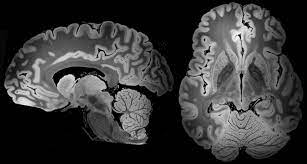
MRI SCAN
Magnetic resonance imaging (MRI) is a medical imaging technique that uses a magnetic field and radio waves to produce detailed images of the body’s internal structures. MRI is used to diagnose a wide range of conditions and is often used to guide biopsies, surgery, and other procedures. MRI scans are painless, noninvasive, and do not use ionizing radiation, making them a safe and effective way to visualize the inside of the body. During an MRI scan, the patient is placed on a table that slides into a large, cylindrical machine.
The machine generates a strong magnetic field around the body and sends and receives radio waves to create detailed images of the body’s internal structures. The MRI scanner has a tube-like shape and is open at both ends, allowing the patient to easily see out. Some patients may feel a bit claustrophobic inside the MRI machine, but most people are able to tolerate the exam without any problems.
What Is MRI SCAN:
Magnetic resonance imaging (MRI) is a medical imaging technique used to produce detailed images of the inside of the body. It uses a powerful magnetic field, radio waves, and a computer to create detailed pictures of the inside of the body. MRI scans are often used to diagnose medical conditions, such as cancer, heart problems, and injuries to the brain and spinal cord. They can also be used to guide medical procedures, such as biopsies and surgery. MRI scans are generally safe and do not involve any ionizing radiation. However, they may not be suitable for everyone, particularly those with certain types of metal implants or pacemakers.
What We Should Know About The MRI SCAN:
Here are some things you might want to know about MRI scans:
- MRI scans do not use ionizing radiation, so they are generally considered to be safe.
- MRI scans can produce detailed images of the inside of the body, including organs, muscles, bones, and other tissues.
- MRI scans are often used to diagnose medical conditions, such as cancer, heart problems, and injuries to the brain and spinal cord.
- MRI scans may not be suitable for everyone. People with certain types of metal implants or pacemakers may not be able to have an MRI scan.
- MRI scans can be noisy, and some people may find the enclosed space of the MRI machine to be claustrophobic.
- MRI scans may take longer than other types of medical imaging, such as X-rays or CT scans.
- MRI scans may require the use of contrast agents, which are injected into the body to help produce clearer images.
- MRI scans are generally painless, although some people may experience discomfort from lying still for an extended period of time.
MRI SCAN How To Get It?
To get an MRI scan, you will need a referral from a healthcare provider. Your provider will determine if an MRI scan is necessary based on your medical history and symptoms, and will write a referral to a facility that offers MRI services. You will then need to make an appointment with the facility for the scan.
When you arrive for your appointment, you will be asked to remove any metallic objects, such as jewelry, watches, or clothing with metal zippers or buttons. You may also be asked to change into a hospital gown.
During the scan, you will lie on a table that is moved into the MRI machine. The machine will produce loud noises during the scan, so you will be given earplugs or headphones to wear. You may also be given a panic button to signal the technician if you feel uncomfortable at any time.
The scan typically takes 30-60 minutes, depending on the body part being imaged and the type of scan being performed. After the scan, you will be able to return to your normal activities. Your healthcare provider will receive the results of the scan and discuss them with you at a follow-up appointment.

If you want to get amazing benefits by using this link
Imaging For Low Grade Prostate Farmington
MRI SCAN Conclusion:
In conclusion, MRI is a medical imaging technique that uses a powerful magnetic field, radio waves, and a computer to produce detailed images of the inside of the body. It is often used to diagnose medical conditions and guide medical procedures, and is generally considered to be safe.
MRI scans may not be suitable for everyone, and may produce loud noises and require the use of contrast agents. To get an MRI scan, you will need a referral from a healthcare provider and will need to make an appointment with a facility that offers MRI services. The scan typically takes 30-60 minutes and is generally painless, although some people may experience discomfort from lying still for an extended period of time.









